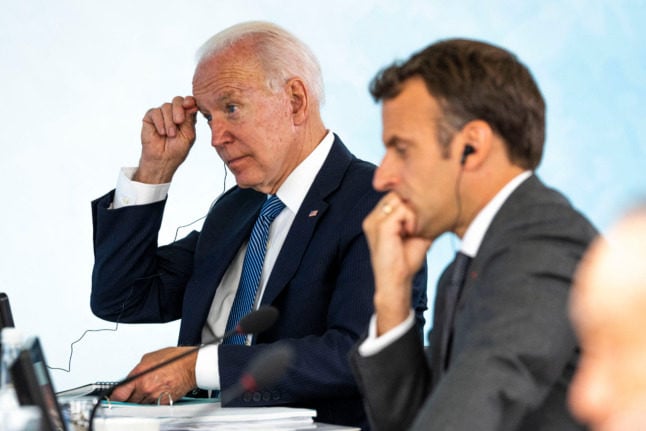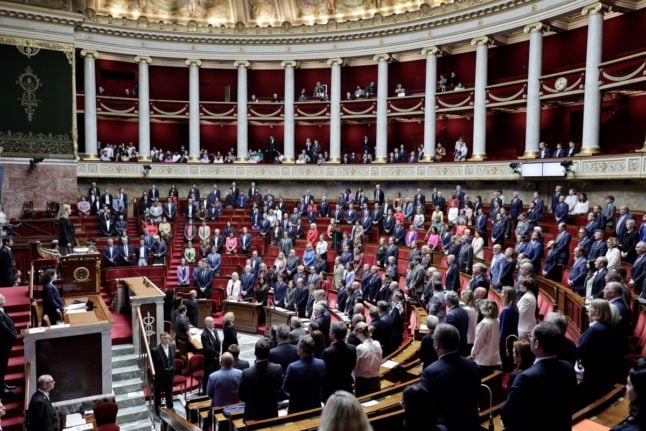Macron was left furious by Australia’s decision last week to ditch a 2016 deal to buy diesel submarines from France in favour of nuclear-powered ones from the United States and Britain.
After a cabinet meeting, government spokesman Gabriel Attal made clear French anger had not abated with an unusually frank statement of Macron’s expectations from the scheduled conversation with 78-year-old Biden.
The exchange would be an opportunity to “clarify both the way in which this announcement was made and the way for an American re-engagement in its relationship with an ally,” Attal said.
Paris was particularly outraged that Australia negotiated with Washington and London in secret, which French Foreign Minister Jean-Yves Le Drian denounced as “treachery” and a “stab in the back”.
French officials were notified about the loss of the contract just hours before Biden unveiled the new AUKUS security and defence partnership between the three English-speaking countries.
READ ALSO OPINION: France’s Australian submarine row shows that Macron was right about NATO
Macron was expecting “clarifications about the American decision to keep a European ally outside of fundamental talks about cooperation in the Indo-Pacific,” Attal added, without giving the schedule time for the exchange.
“We expect our allies to acknowledge that the exchanges and consultations that should have taken place did not, and that this poses a question about confidence, which all of us need to draw conclusions about now.”
Showdown
The submarine row has plunged Franco-US ties into what some analysts view as the most acute crisis since the US-led invasion of Iraq in 2003, which Paris opposed.
After four years of tumultuous relations with ex-president Donald Trump, the spat has also dashed hopes of a complete reset under Biden, who took office in January aiming to rebuild frazzled ties with Europe.
As the row drags on, observers and some of France’s European partners are wondering how and when the French leader will call an end to the face-off, which is playing out just seven months ahead of presidential elections.
British Prime Minister Johnson said it was “time for some of our dearest friends around the world to ‘prenez un grip’ (get a grip)” in comments in Washington that mixed French and English.
“‘Donnez-moi un break’ because this is fundamentally a great step forward for global security,” he told Sky News.
Danish Prime Minister Mette Frederiksen, whose country is staunchly pro-American, defended Biden as “very loyal” and warned against turning “challenges which will always exist between allies into something they should not be.”
Conditions
Attal said that France and the US needed to begin a process “to create the conditions for confidence to be restored”.
As well as an acknowledgement of French interests in the Pacific region, the process should include “full recognition by our American allies of the need to boost European sovereignty as well as the importance of the growing commitment by the Europeans to their own defence and security.”
This latter point is a source of tension between Biden and Macron, who has pushed hard during his four-and-a-half years in office for Europeans to invest more in defence and pool resources in order to increase their joint military capabilities.
The US, and some EU members including Denmark and Baltic countries, see this as a potential challenge to NATO, the US-led transatlantic military alliance that has been the cornerstone of European defence since World War II.
French Defence Minister Florence Parly argued against the idea of France withdrawing from NATO command structures, which some politicians in France have suggested in the wake of the submarines snub.
“Is it worth slamming the door on NATO? I don’t think so,” she said, while adding that “political dialogue is non-existent in NATO.”
Australia’s decision to order nuclear-powered submarines was driven by concern about China’s commercial and military assertiveness in the Pacific region, where Biden is seeking to build an alliance of democratic states to help contain Beijing.



 Please whitelist us to continue reading.
Please whitelist us to continue reading.
No point in walking out on NATO if no one else is going to follow you out the door. Looks like NATO is more united than the EU.